Kremlin-linked Telegram channels seed anti-Ukraine and anti-West narratives in Bulgaria
Pro-Kremlin Bulgarian Telegram channels amplify disinformation seeded by Kremlin-run channels
Kremlin-linked Telegram channels seed anti-Ukraine and anti-West narratives in Bulgaria
Share this story
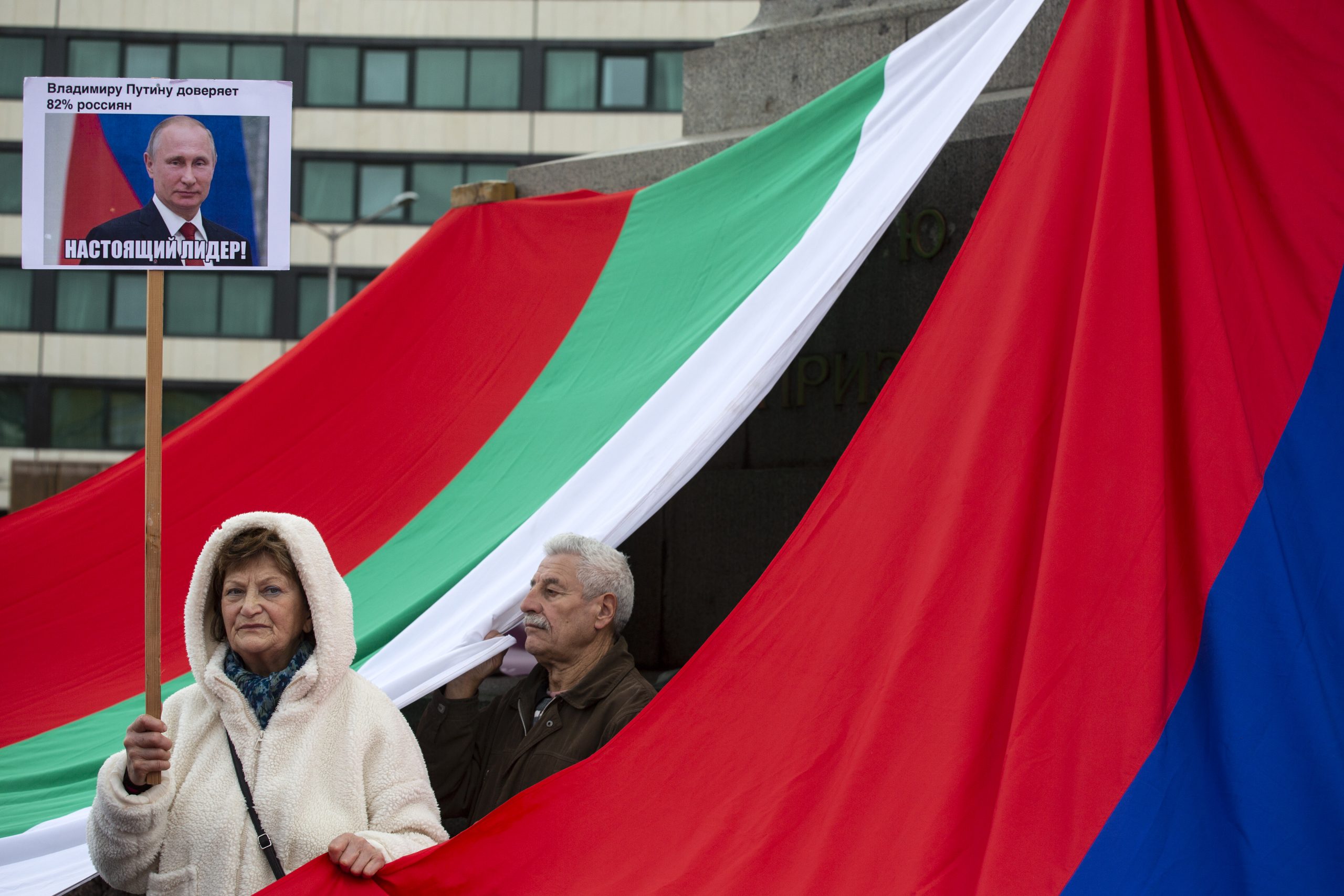
BANNER: March in support of Russia in the center of Sofia, Bulgaria on 10 December 2022. (Source: Hristo Vladev/NurPhoto via Reuters)
Kremlin-run Telegram channels are seeding falsehoods into the Bulgarian information landscape, which pro-Kremlin channels then amplify in order to reach a larger audience. The DFRLab identified three channels run by the Kremlin or Kremlin-linked entities in Bulgaria that are amplified by the twenty-three pro-Kremlin channels. However, the pro-Kremlin Bulgarian-language channels do not solely rely on the three channels for content; they also post their own deceptive narratives. The analyzed channels promoted anti-Western and anti-Ukraine sentiments to their thousands of subscribers.
Russian influence operations targeting Bulgaria have already led to deep polarization and divisions within the country, according to media reports. Bulgarian officials asserted that Kremlin-linked online disinformation campaigns have already led to offline consequences, such as protests against Ukrainian grain imports. Due to the similarities between the Bulgarian and Russian languages, the latter is widely understood and spoken in Bulgaria. This contributes to Bulgaria’s disinformation ecosystem as there is greater exposure to Russian-language information operations.
Despite Facebook being the most popular social media platform in Bulgaria, Telegram, along with other messaging apps, is “growing in popularity, in part because they facilitate avoiding legal restrictions or Facebook’s community standards,” according to the 2023 report by the Reuters Institute.
Bulgarian-language channels
The DFRlab identified twenty-three Bulgarian language pro-Kremlin channels with more than 65,000 subscribers total. Most of the channels were created in 2022 following Russia’s invasion of Ukraine, but some channels pre-dated the war and were created in 2021, while others were created in 2023.
Only three of the twenty-three channels state that they are pro-Russian in their description. Other channels describe themselves as providers of “uncensored news,” information platforms, or advocates for Bulgaria’s “liberation” from NATO, the United States, and the West.
The most popular channel in the dataset is Bgmilitary, with 13,260 subscribers, which purports to be an official platform for the Vasil Levski Military Union, a pro-Russian Bulgarian paramilitary unit. According to a Bellingcat report, in 2019 the group exploited the migration crisis in Europe to carry out “civic arrests” of migrants. The group has a history of promoting anti-NATO and anti-EU campaigns. In 2022, Sofia launched an investigation into the alleged crimes committed by the pro-Russian paramilitary group. In early 2024, Bulgarian authorities closed the investigation stating that they “couldn’t detect the criminal activity.”
Another popular channel is InfodefBULGARIA, which the DFRLab previously identified as being a part of a broader pro-Kremlin network targeting Telegram users in at least twenty countries and ten languages.
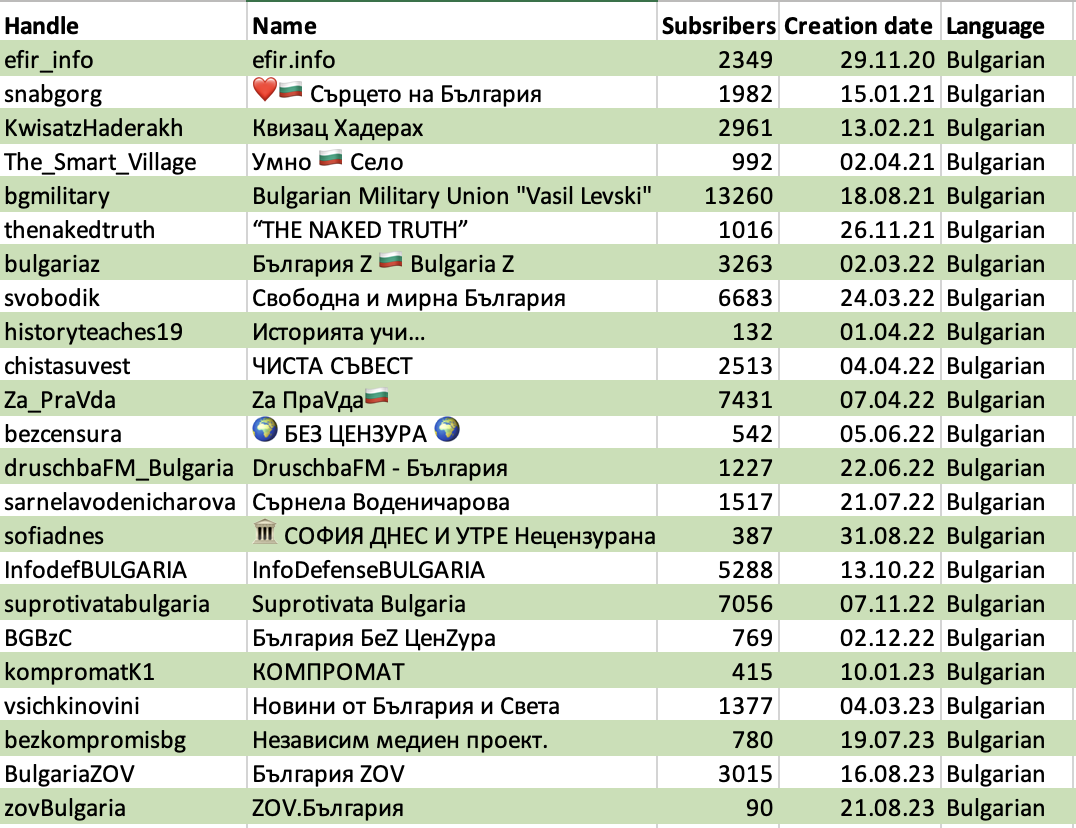
The DFRLab reviewed the channels’ activity over a one-year period to observe their growth, with considerations made for variations in creation dates. Due to TGStat limitations, we could not collect data for all the channels. According to the available data, the channels largely experienced relativity similar growth patterns, but at least two channels saw their subscribers decrease.
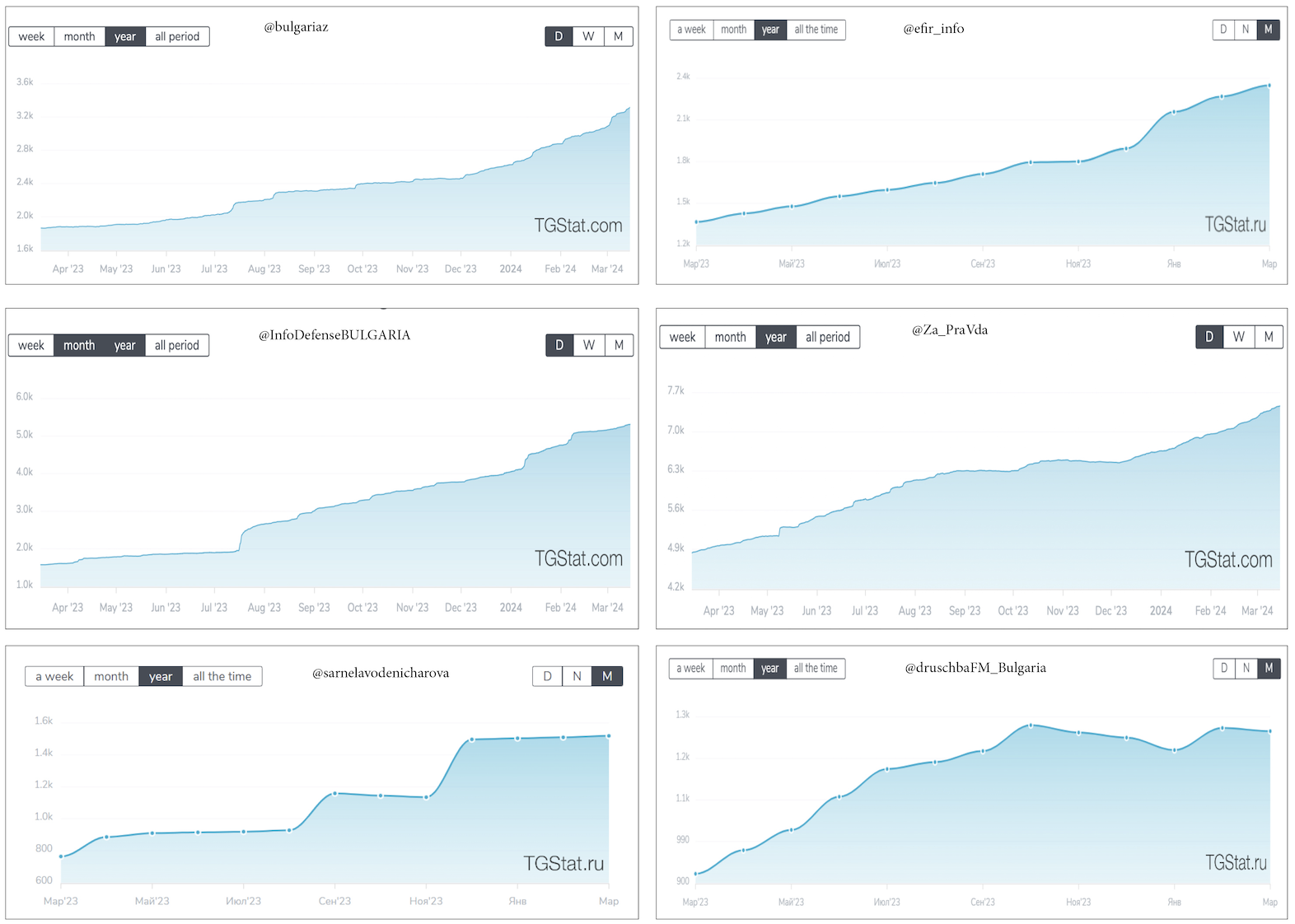
The DFRLab used the browser-based scraper TG collector to gather more than 358,102 Telegram messages posted on the twenty-three channels from November 2020 through March 2024. During this period, the channel with the highest number of posts was KwisatzHaderakh, with more than 75,419 messages. Next was bulgariaz with more than 51,856 messages. Both channels are anonymous and unattributable. Further, the volume of posts for all channels increased in early 2024.
Chart showing the number of messages sent per day from all the analyzed channels. The observation period was November 2020 through March 2024. (Source: @EtoBuziashvili via TG Collector, Tableau Public)
Network analysis
The DFRLab mapped the cluster of channels to better understand how they interact with one another. Forwards were collected from the twenty-three channels via TG Collector. Mentions were analyzed manually using systematic queries of the twenty-two channels (excluding the channel that was under analysis). We also reviewed the mentions data for forwards to avoid duplication.
Twenty-two of the twenty-three channels amplified one another 11,918 times. The channels with the highest mentions and shares were Za_PraVda (2,066), efir_info (1,699), and bulgariaz (1,566).
The topics covered in cross-posted channels varied but included anti-NATO reports, anti-Ukraine posts, discussions of domestic policies, and calls for mobilization. For example, on February 4, 2024, six channels in the cluster posted an identical message containing a video report calling on Bulgarians to sign a petition to hold a national referendum on Bulgaria’s neutrality. The post amplified a common fearmongering narrative that asserts Bulgaria will be dragged into a war with Russia if it doesn’t remain “neutral” towards the war against Ukraine. The DFRLab has previously investigated how pro-Russia actors used this fearmongering narrative in Moldova and Georgia.
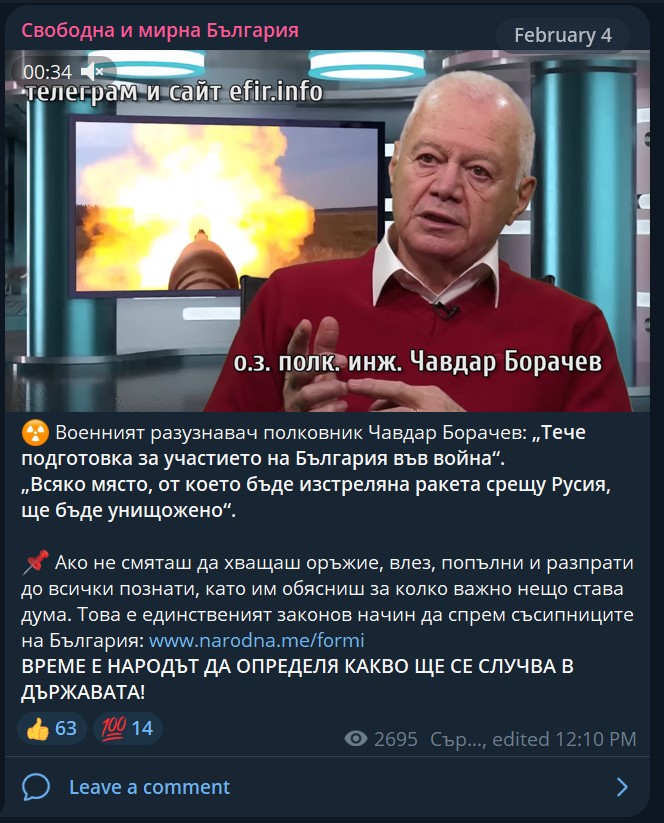
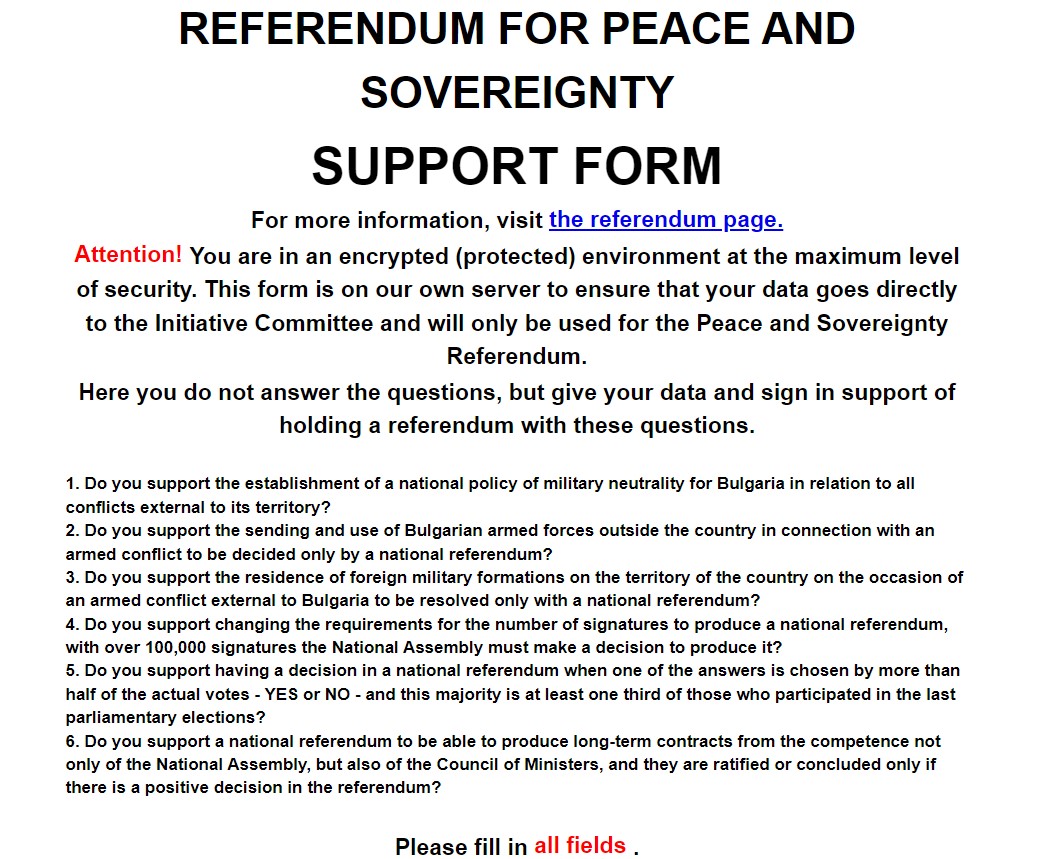
The proposed referendum is not new in Bulgaria. The “Referendum for Peace and Solidarity” committee, comprised of pro-Kremlin figures, has previously advocated for holding a referendum to determine whether Bulgaria is a neutral country that will not support Ukraine. The committee organized protests in Bulgarian cities, reportedly collecting demonstrators’ signatures for the referendum petition. Russian media outlets covered the protests, writing articles about Bulgarians demanding the country remain “neutral” in Russia’s war against Ukraine. The DFRLab found that the protest organizers created a Telegram group to collect signatures for the referendum, but the group had only 1,377 members as of March 18, 2024. Additionally, among the twenty-three pro-Kremlin channels, two – “svobodik” and “sarnelavodenicharova” – share the same profile image, which is the logo of the referendum committee; the latter channel is affiliated with one of the representatives of the committee, Sarnela Vodenicharova.
Another widely spread Telegram post encouraged Bulgarians to mobilize online to protest their government’s policy toward Ukraine. Five channels in the cluster shared the same post asking Bulgarians to take action and support Russia against “the corrupt government of Ukraine.” The message was originally published on February 2, 2024, by BulgariaZOV.

By analyzing forwarded posts, the DFRLab identified another 2,482 new channels that were amplified by the main cluster. These include the channels of pro-Kremlin Bulgarian journalist Dilyana Gaytandzhieva, Kremlin propagandist Vladimir Solovyov, the fake pro-Kremlin fact-checking platform War on Fakes, and other Bulgarian channels that often publish conspiracy theories or baseless health-related information, among others.
The DFRlab also found that at least three Kremlin-linked channels focusing on Bulgaria – Russian embassy in Bulgaria, Strategic Culture Foundation, and Russian House in Sofia – are amplified by the cluster of twenty-three channels.
According to the Ukrainian government web portal “War and Sanctions,” the Strategic Culture Foundation is “closely associated” with Russian intelligence services, targets foreign audiences with Kremlin disinformation, and promotes actions destabilizing Ukraine. The organization is sanctioned by several Western countries. Among the channels in the cluster, Historyteaches19 forwarded at least thirty posts from the Strategic Culture Foundation channel and urged readers in various posts to subscribe to it.
Russian House Sofia is one of the foreign representative offices of Rossotrudnichestvo, Russia’s Federal Agency for the Commonwealth of Independent States, Compatriots Living Abroad and International Humanitarian Cooperation. The agency is overseen by the Russian Ministry of Foreign Affairs. According to the Ukrainian government, the agency serves as an umbrella organization for Russian agents of influence and finances influence operations across Europe. Rossotrudnichestvo is sanctioned by several nations for its support of the war in Ukraine.
Seventeen of the twenty-three channels amplified these three Kremlin-linked channels a total of 3,070 times to their audiences in Bulgaria. The most shared channel was “rusembul,” the channel for Russia’s embassy in Bulgaria, the channel was shared 2,883 times. Russian House Sofia was shared 150 times, and the Strategic Culture Foundation was amplified thirty-eight times.
The Kremlin-linked channels spread conspiracy theories that were later amplified by the pro-Kremlin channels. One example relates to the well-documented “US-funded biolabs” narrative, that has been leveraged by the Kremlin to discredit the United States, misrepresent relations between the United States and Ukraine, and even to justify the invasion of Ukraine. We found that the Kremlin-affiliated channels shared the biolabs narrative to a Bulgarian audience on Telegram as early as March 2022. Some of these posts were later amplified by the identified pro-Kremlin Bulgarian channels. According to analyzed forwards, at least eleven posts by the Russian embassy in Bulgaria were reshared by five pro-Kremlin channels within the last four months. This number is based on existing data but it may be an undercount as during the course of our research one channel, @BGBzC, България БеZ ЦенZура (“Bulgaria without Censorship”), was deleted.
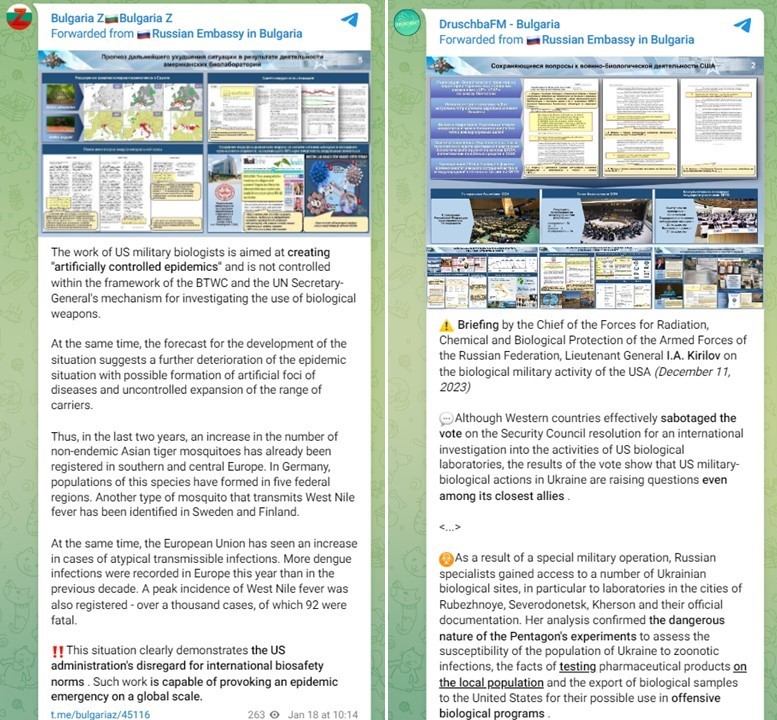
The false and widely spread Kremlin narrative that claims the United States operates biolabs in Ukraine or that the West is preparing a new tactic involving a “special chemical belt”was also amplified in the Bulgarian language. These narratives are first spread via Kremlin-owned media outlets, then amplified by official Kremlin-affiliated channels, such as the Russian embassy in Sofia. These false narratives then gain popularity among domestic pro-Kremlin actors who reshare or reuse them, sometimes as the basis for further baseless allegations.
The analyzed pro-Kremlin Bulgarian channels pushed similar disinformation narratives involving biolabs at least twenty-seven times, excluding the embassy posts, exemplifying how the narrative evolves. Ten of the posts were shared on the now deleted channel @BGBzC. Among them is a false post that alleged in January 2024 that journalist Dilyana Gaytandzhieva found “evidence” that US bio-laboratories in Bulgaria conduct “dangerous experiments.” Gaytandzhieva is a Bulgarian journalist with reported Kremlin ties. Her “investigation” was debunked by several fact-checking organizations, including the DFRLab. The post was shared by three pro-Kremlin Bulgarian channels, @druschbaFM_Bulgaria, @bulgariaz and the now deleted @BGBzC.
The Kremlin-linked channels pushed another false narrative that accused Ukrainian “neo-Nazis” of targeting civilian populations with the support of Western allies, while claiming that Russia has the moral high ground as it only attacks military targets. This false claim was disseminated in several posts from the Russian embassy in Bulgaria. The pro-Kremlin Bulgarian channels also actively amplified this claim, helping to further pollute the Bulgarian information space with false narratives.
Governments, organizations, and media outlets have repeatedly debunked this false accusation with evidence that includes footage from the ground and satellite imagery. A report by the US Embassy in Tbilisi documented how “Russian shelling has hit Ukrainians in their homes, hospitals and theatres and even while they were pushing their children in strollers down the street.”
Cite this case study:
Eto Buziashvili and Sayyara Mammadova, “Kremlin-linked Telegram channels seed anti-Ukraine and anti-West narratives in Bulgaria,” Digital Forensic Research Lab (DFRLab), April 3, 2024, https://dfrlab.org/2024/04/03/kremlin-linked-telegram-channels-bulgaria.

